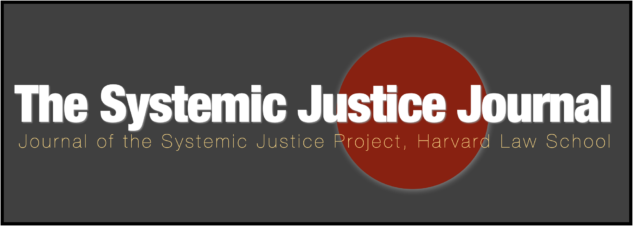
SJ Journal
Volumes
Search the Journal
Results (Searching...)
Featured Articles
This paper seeks to contextualize the history of corporations by revealing its ties to slavery and the cotton industry in the early nineteenth century. By revealing the ways corporations legitimized racial hierarchies, we better equip ourselves to addressing modern-day instances
The testing of cosmetics, chemicals, and medicine on non-human animals is conventionally justified as scientific advancement without regard to the suffering of these animals. This paper examines how corporate legal theories have contributed to the prevalence of this practice and
The Problem of Corporate Political Spending on the Governors Associations
The private probation industry is broken. Low-income people are placed under the supervision of private probation companies solely due to their inability to pay a court fine. From there, they are routinely charged hundreds or thousands of dollars in fees
Child labor is a widespread problem in global cocoa supply chains. Nestlé, one of the largest cocoa companies, offers an example of how major cocoa companies describe the problem. Nestlé tells the public that child labor is a local problem
Chickens raised for food are an important part of most Americans’ daily lives—in the United States alone, over 9 billion chickens are slaughtered every year. Yet the chicken industry causes immense suffering to both the animals and humans involved.
Corporations, empowered and legitimized by corporate law and theory, are avoiding the burden of their (outsized) contributions to climate change by passing that responsibility on to individual consumers who have limited ability to make large scale change.
Recent Articles
-
The Moral of the Marketplace: Profit - Big Oil’s Prioritization of Profit Over Environmental and Human Safety
-
Shale Games: How the Natural Gas Industry Is Swindling Investors, Society and the Planet
-
Deferred and Non-Prosecution Agreements: A Split Reality for the Individual and Corporate Criminal Defendant
Lenient treatment of corporate executives who knowingly and intentionally harm the public is widespread. Corporate non-prosecution or deferred prosecution agreements (N/DPAs) — where the state agrees to drop or defer charges in exchange for the corporation paying a fine and
-
Landlords as Cops: Criminal Act Evictions and the Illusion of Order
Since the 1980s, there has been an expansion of federal, state, and local law authorizing eviction for criminal activity. This growing body of carceral housing law fostered a system of tenant screening, monitoring, and marking that replicates the harms of
-
Corporate Influence: Exploring the Relationship Between Lobbying and Corporate Power